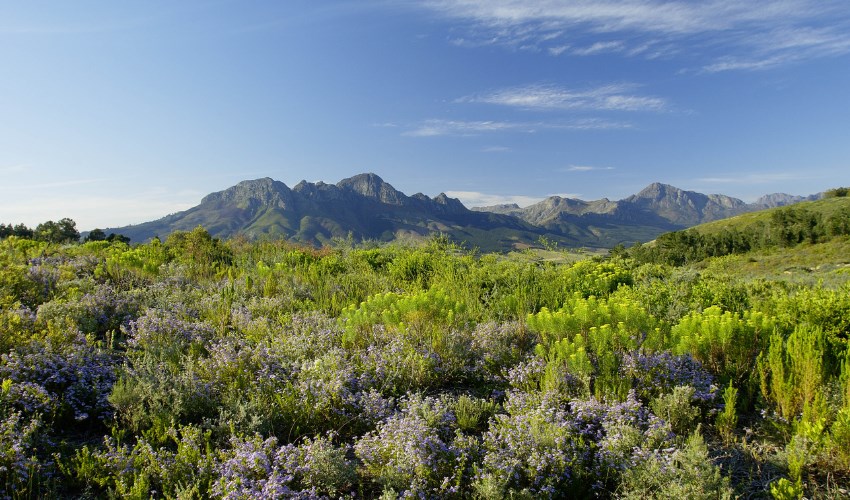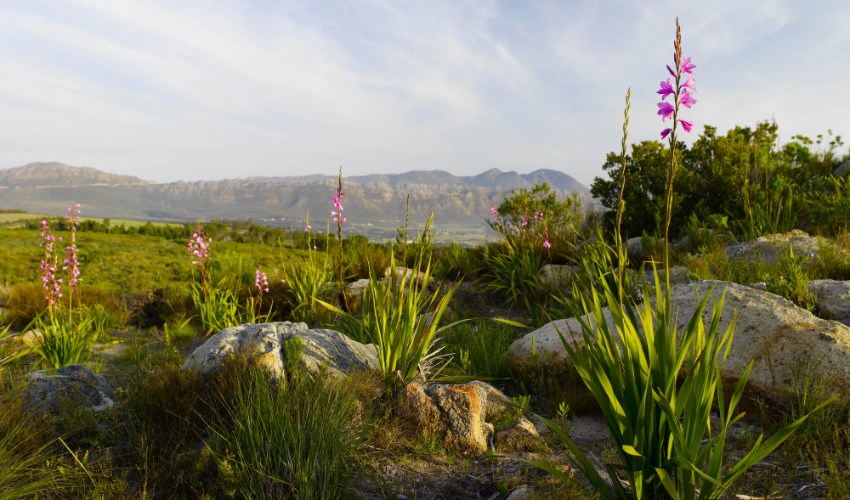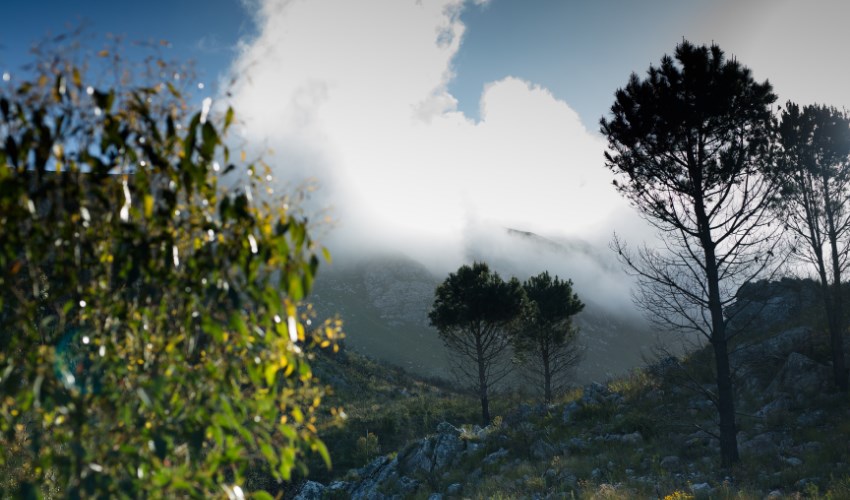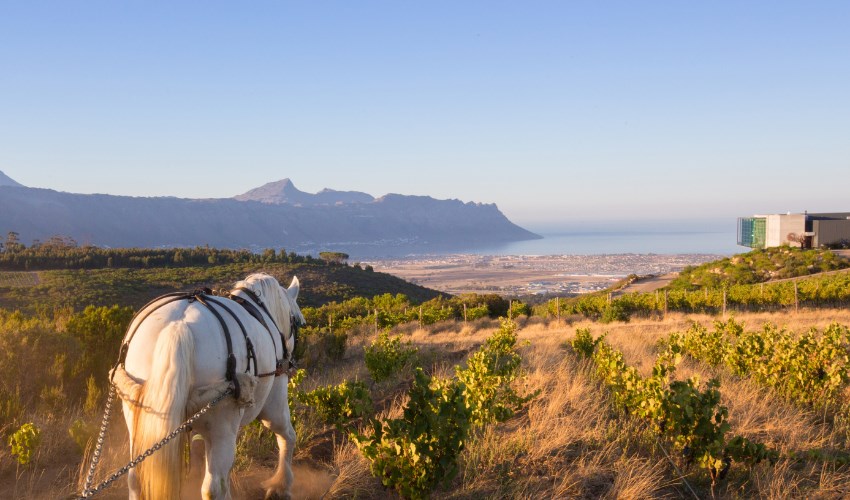
Waterkloof Wine Estate boasts a rich diversity of indigenous flora and fauna.
Wines with a conscience is a subject that the informed consumer takes to heart when having a glass of their favourite wine. With access to information in the digital age, consumers are keeping an ear on the ground on the impact vineyard expansion has on the Cape Flora Kingdom and natural landscape that stretch through the Cape wine regions. We visit two WWF Conservation Champions who, in partnership with World Wide Fund for Nature (WWF) South Africa, detail their sustainable farming journey, biodiversity, and the benefit of championing the preservation and management of their natural resources.
Living in harmony
“Functioning natural habitats, the species that occur in these habitats and the interactions between species and their environments is the backbone of biodiversity on the farm,” says Claudia Young-Kelly, sales and marketing manager at Waterkloof Wine Estate. The estate is situated within the Cape Floral kingdom and forms part of the Schapenberg Conservancy, which comprises of more than 1600 ha of critical natural habitats.
The Conservancy lies on the outskirts of Somerset West along the Schapenberg hills, and incorporates the lower slopes of the Hottentots Holland Mountains up to Sir Lowry's Pass and includes CapeNature's Hottentots Holland Nature Reserve.
“As part of our conservation drive, we have set aside 50% of the farm for conservation purposes.”
She further elaborates that joining the Biodiversity & Wine Initiative (BWI), as the WWF Conservation Champion programme was previously known, was a no-brainer for Waterkloof Wine Estate.

Endemic flowers on Waterkloof Wine Estate.
As a fifth-generation family farm, Oak Valley Estate in the Elgin Valley has made it a generational imperative to integrate conservation into their over 1700 hectares. Ideally located along the terrains of the Groenlandberg mountains which consists of a range of arable and non-arable terrain, it gives the estate diverse challenges of how to execute their conservation plan.
A few landowners in the area have come together to ensure that this range stays in its natural state as much as possible, by following ethical and sustainable means of farming since the area is known for fruit and grape production.
“Being part of the WWF Conservation Champions is a commitment to the future generations. The mountains and its slopes have a diverse flora and fauna, promoting and preserving it was a priority for us as a farm,” says winemaker and viticulturist Jacques du Plessis. The combination of vineyard management within the flora and fauna on the farm gives him an ideal setting to create quality wines that represent their terroir.

Oak Valley Estate is located along the terrains of the Groenlandberg, home to a diverse flora and fauna.
Sustainable farming
Managing natural resources on a working farm, needs one to have their finger on the pulse on the daily activities.
“As seasons change, farming practices on the farm vary from one season to the other. It's therefore important to have a nature conservation plan that will fit hand-in-glove with our general farming and vineyard practices,” says Claudia.
Waterkloof has implemented a vigorous system that ensures efficient vineyard management with less negative impact on the soil.
A Nguni herd of cattle ensures a constant production of biodynamic compost, which is used in the vineyards and on the farms’ vegetable and herb gardens. While most farms are fully mechanised, their four Percheron horses do most of the spraying, ploughing, composting, and harvesting on the farm, thus minimising soil compaction. The spraying of vineyards is in line with a detailed Integrated Pest Management (IPM) system which varies from introducing natural enemies for pests to installing perches for birds of prey.

A Percheron horse ploughing the land on Waterkloof Wine Estate.
A diverse business model bodes well for Oak Valley, which has a wine, fruit and flower section on the farm.
The mix of different crops, cultivars as well as the forested sections and waterways attract a diverse array of birds, and insects at any time of the year. The presence of these animals and insects means Integrated Pest Management has also been introduced to the farm.
The area is also marked as a zone where mating disruption of fruit fly is implemented.The farm has an alien clearing and fire management programme which includes well scheduled burning programmes as well as fire break to help quell unplanned ignitions.
Edible natural resources are also thriving on the farm with foraging of seasonal mushrooms, a notable delicacy at the Melting Pot Restaurant.
More than wine tasting
“I cannot think of a better way to add value to our wines other than the commitment to farm responsibly; not only for our consumers but for nature itself,” say Jacques.
This commitment has seen more feet on the farm, especially since customers and nature lovers are now accessing parts of the farm that they previously could not.
He further mentions that their Mountain Bike Trails have become very popular in the valley with its mixed challenging trails, which become a draw card for family rides as it caters for all riders. The trails are featured annually in the Cape Epic which attracts riders from the global cycling circuit.
“As one rides within our mountain terrain one notices a striving fynbos heritage, which creates an added responsibility for preservation.”
He concludes that the feedback they get from consumers on the value of the environment indicates that they are on the right path.
Building up nature-oriented activities has increased and diversified the consumer base at Waterkloof Estate.
“We offer “Ride with Us” and “Walk with Us” packages that give the consumer a first-hand experience of the diversity of Cape Floral Kingdom on the farm. This is a big draw card for us and it helps promote the initiative of conservation that we have on the farm,” says Claudia.
This has also promoted the farm above its competitors as consumers are encouraged by the conservation work done on the farm. She concludes that most consumers understand sustainability, conservation, and working in harmony with nature, and that it is steadily playing a role in the selection of wines that appeal to their conscience.
Keep up to date with all things related to the WWF Conservation Champions HERE.